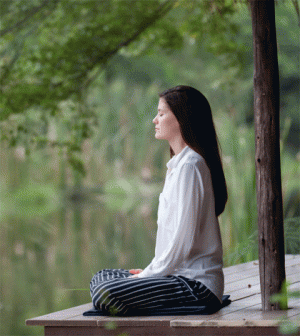- Finding Unshakable Power in a World That Wants to Pull Us ApartPosted 6 months ago
- What could a Donald Trump presidency mean for abortion rights?Posted 6 months ago
- Financial Empowerment: The Game-Changer for Women in Relationships and BeyondPosted 7 months ago
- Mental Health and Wellbeing Tips During and After PregnancyPosted 7 months ago
- Fall Renewal: Step outside your Comfort Zone & Experience Vibrant ChangePosted 7 months ago
- Women Entrepreneurs Need Support SystemsPosted 7 months ago
The Unexpected Power of Mindfulness & Meditation

By Ed and Deb Shapiro
There is a sanity and brilliance to mindfulness and meditation, from awakening inner strength, kindness and fearlessness to inviting radical change.
As an activist in a Chinese jail, Kiri Westby used meditation to maintain her peace amidst the hardship. Seane Corn used yoga and mindfulness to work with teenage prostitutes in LA. Play therapist Megan Cronin Larson says meditation has deeply influenced her work with children, as detailed in our new book, The Unexpected Power of Mindfulness & Meditation, available on Amazon.com.
But sitting still can easily appear boring, the mind longs to be entertained! In fact, past or future can become so engrossing that being in the present moment may seem somewhat lackluster in comparison. So instead of stillness, we fill our minds either with what-could-have-been, what-might-have-been or if-only, or with what-could-be, what-will-be or what-might-be.
Luckily, present-moment awareness frees us from this endless cycle of ‘what if’ and is immensely liberating. There’s nothing going on but this very moment, nothing more is required of us than to just be here, now. What a relief!
When we are present then the world becomes quite extraordinary, as if being seen and heard for the first time without preconceived ideas or desires. There is just the experience. And, like a child exploring the unknown, we are impelled to understand and know it more intimately.
Present-moment awareness takes us out of the logical or rational mind, which doesn’t mean we step into nowhere or nothingness; we don’t become disconnected or cast adrift. Rather, we step into sanity and even greater connectedness. This is the extraordinary and delightful part of presence. It is innately natural, as if we are back in a deeply loved but forgotten place.
“When I was 15 years old, my mother took me on a residential meditation retreat in the English countryside,” recalls Deb. “My siblings were all elsewhere and my mother had no intention of leaving me on my own in London. As I already knew some of the people who would be there, and as she was only going for three days, I reluctantly agreed.
“As it was, my mother stayed for three days and I stayed for ten. I didn’t really understood what I was doing, but sitting in silence gave me the feeling that I was exactly where I was meant to be. I sat for hours. I didn’t want to leave. I didn’t want to be parted from this place of belonging. I was home again, even though I didn’t know that I had ever left.”
Simply being still, without thought of before or after, encourages a deep sense of completion, that there really is nowhere else we need to go. It is impossible to think of somewhere else as being better—the grass is vividly green exactly where we are.
For instance, we were in England visiting with Deb’s mother, Anne. We had been invited for tea at the House of Lord’s in London to discuss a meditation center with one of the Lords. In a rush to catch a train we were quickly downing breakfast when the toast burned. We watched in amusement as Anne took a deep breath and said, “Oh dear, burned toast,” then calmly tossed the offending item in the trash and put a fresh slice of bread in the toaster.
Few of us have such a calm reaction to burned toast, especially when we are in a hurry. Rather, we usually wish things were different to how they are. But we can make a song and dance about whatever is wrong, like burned toast, and get even more stressed or we can take a deep breath and put a fresh slice of bread in the toaster.
“If I accept burnt toast as a ‘fact’, somehow that takes away the irritation I normally feel and replaces it with a wry admiration for the splendidly black crusts,” says author Anne Bancroft. “It doesn’t stop me changing the setting of the toaster but it seems to make the whole situation easy instead of annoying.”
So the equation is simple: as mindfulness and meditation become an intimate part of our lives, so we evolve and change. When we evolve and change then we move into a more wakeful, aware, and loving state. And all that we have to do for this chain of events to occur is learn to be still; mindfulness and meditation encourage us to abide in that stillness.
****
 Ed & Deb are the authors of The Unexpected Power of Mindfulness & Meditation. Deb is the author of Your Body Speaks Your Mind, now in 19 languages. They have six meditation CDs.
Ed & Deb are the authors of The Unexpected Power of Mindfulness & Meditation. Deb is the author of Your Body Speaks Your Mind, now in 19 languages. They have six meditation CDs.
See more at EdandDebShapiro.com






